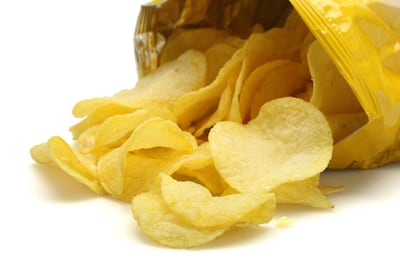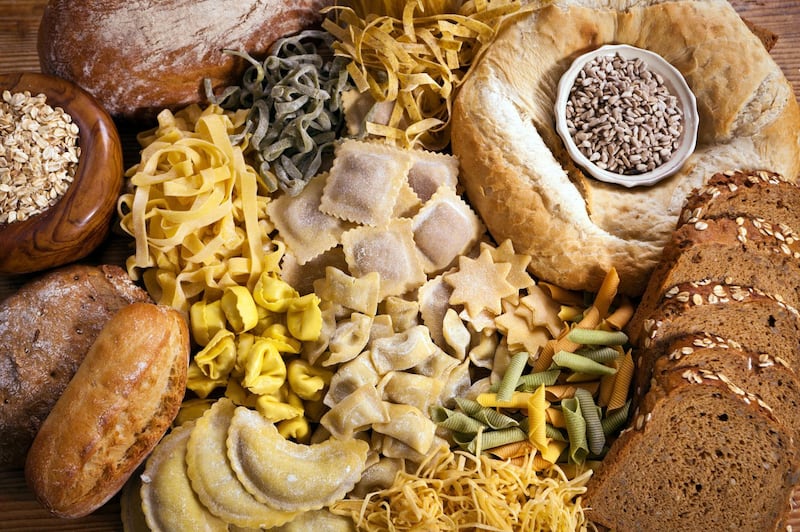There’s no point denying it: carbs are the food equivalent of a warm, loving hug. Long day at work? Here, sink into the compassionate embrace of a crunchy packet of crisps. Need to put a mental wall between your bickering kids so you can get a better handle on your sanity? There’s savage satisfaction to be had by shovelling in forkfuls of pie until the irritation subsides.
In a humane world, the foods that force us out of our funk would be chock-full of nutrition. But unless you’re Gwyneth Paltrow, it’s unlikely that you’re looking for comfort in a bag-full of kale or celery stalks. Typically, comfort foods are high-calorie, fast-digesting carbs, loaded with sugar or salt.
Why do we crave carbs?
Researchers have been studying the tumultuous relationship between mood elevation and carb cravings for a long time now. Multiple studies show that simple carbs trigger the pleasure centres of the brain by releasing dopamine. It’s the reason each bite of a buttery bagel, sweetened scone or hot, salty French fries makes you feel so good. Once you’ve experienced a dopamine spike, the inevitable low or crash in a few hours will take some getting used to, which is why you crave more of the same even after you’ve already indulged. This in turn leads to overeating and weight gain, among a host of other health conditions. Give in to carb cravings often enough, and the climb down can get harder and harder each time.

Sounds like addiction? Some scientists agree. Before you declare this food group as personal enemy number one, give yourself and your willpower some credit. Most of us are well-adjusted enough to give in to cravings every once in a while without sliding all the way down the slippery slope of dependency. Still, it’s important to understand why our bodies behave the way they do; knowing why you’re craving carbs is the only way to deal with it in a healthy manner.
According to a 2013 study published in the American Journal of Clinical Nutrition, an overindulgence in carbs with a high glycemic index (foods that cause blood sugar levels to spike rapidly after consumption) can activate the same areas of the brain as drugs and cigarettes. Celebrity nutritionist and founder of Health Total, Anjali Mukerjee, confirms the theory that “the more carbs you eat, the more you’ll crave. That’s because carbs produce insulin, which lowers excess blood sugar, and low blood sugar makes you crave more carbs. This creates a cascade effect, making your body mistake cravings for hunger.”
Stress, too, makes people crave salt because it is required to make aldosterone, which helps keep the stress hormone cortisol in check, says clinical nutritionist Stephanie Karl, from Up and Running Sports Medicine Centre in Dubai. “In the long term, it can cause oxidative damage – a bit like rusting – to cells.”
Certain foods in your diet can trigger a longing for sugary dishes.

“One dietary culprit is low protein intake. Satiety receptors – which signal fullness – respond to protein and fat,” says Karl. “This is the reason high-carb foods such as breads, pastas and rice, with insufficient fibre and protein make you feel hungry soon after eating, yet are easier to overindulge in.”
The bottom line is, high-carb and refined foods may be comforting because of the symphony of feel-good chemicals they release in the brain, but they slow down your metabolism, impede cellular health, and a cell’s ability to heal and restore, impede your weight-management efforts, and can even keep you from staying focused. “Junk food marketers exploit this science by not just setting a scene, but also strategically managing the ratio of fat, sugar and salt to boost dopamine and causing an addiction response,” says Karl.
Low-carb diets may not be the answer
The minute the body gets carbs, it stops breaking down stored fats for energy. It’s no wonder, then, low-carb and high-fat or protein diets have been gaining popularity around the world in recent years. Restricting carbs will make your body go into a metabolic state where it switches to fat as the primary source of energy. The fat oxidation process creates ketones, which the body then uses for energy. Anyone who has ever tried the keto, Atkins, or low-carb variations of the Paleo or Mediterranean diets will tell you that reducing carb intake is one of the quickest ways to lose weight.
However, Dr Nicole Sirotin, chair of preventive medicine at Cleveland Clinic Abu Dhabi, warns against the unsupervised and drastic reduction of carbs. “Extremely low-carb diets, like the ketogenic diet, have been studied and found beneficial from the perspective of specific health conditions – such as epilepsy and diabetes – not for general health. For long-term good health and sustainability, I would recommend a well-rounded Mediterranean diet with plant-based carbs in the form of unrefined whole grains, seafood for protein, and limited good fats.”
Karl echoes Dr Sirotin’s sentiment. “Blood sugar improves initially on a very low carb diet, but it can also increase uric acid and fatty plaques on arterial walls. It’s only people who are very well fat-adapted – meaning their bodies can switch easily to burning fat as the primary energy source – who experience the benefits of improved focus, weight loss and reduced inflammation,” she says. “Usually, a very low carbohydrate diet is not sustainable, and people tend to overdo fat and protein intake. The most common side effects are chemical breath, constipation, low mood, low energy, fatigue and sleep problems.
“Instead of adopting unsustainable fad diets, it is better to try intermittent fasting — it cleanses the body and gives it a chance to use stored fat for energy. Another effective method is to exercise while fasting and fuel up later with protein and veggies instead of carbs to make the most of the body’s excess post-exercise oxygen consumption state to promote fat burning,” advises Karl.
Healthy substitutes to break the cycle of carbs cravings
Brown rice with fish is a good option, but practise portion control on the quantity of rice.
Al Jabab bread can be tweaked a bit and made with multigrains such as oats and millets.
- Kabsa, a popular rice dish in Saudi Arabia, can be made with brown rice or whole barley, which are both good carbs with low glycemic index, along with chicken and vegetables
- The porridge-like harees can made with whole wheat and chicken instead of red meat, to lower the calories and glycemic index of the dish
- Sprouts and hummus are healthy options. Tabbouleh and humus can be had with whole wheat or multigrain pita bread and olives. All these are good carbs and have many health benefits if cooked in less oil and with the right whole grains instead of white flour.
Courtesy Anjali Mukherjee







